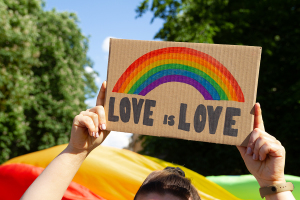How to turn the page when slapped: 3 vital choices worth making

During the Oscars, the global audience witnessed the slap heard around the world. This was a physical slap, yet slaps happen in many forms.
Slaps are not solely physical. Emotional and verbal slaps occur every day in homes, workplaces, and over social media. Cancel culture and public shaming is a slap. Speaking careless words that lack empathy is a slap. Criticizing a teammate or coworker publicly is a slap. Calling your spouse or kids belittling or derogatory names is a slap.
We can’t always control getting “slapped” but we do get to decide how we’ll respond. When my coaching clients feel slapped by life, I regularly ask them, “What opportunity does this slap make possible?” "What choices can you now make to turn the page?"
Will you choose to remain locked inside the trauma of the slap? Will you respond in kind and slap back? Will you let the slap silence your voice or stop your progression toward your goals? Or will you create your own response — one that acknowledges the injustice, refuses to be defined by anyone else’s abuse, and reclaims the narrative of your own story until the slap is only an anecdote of what you overcame on the way toward your goals?
Here are three vital choices I urge you to consider.
1. Choose stillness before strategy
Your life has a frontstage and backstage. Your frontstage is your public life. Your backstage is your private life. The story of your days happens backstage and that empowers your frontstage (how you show up, words and behavior).
We live in a hurried, busy, and noisy frontstage world. Your soul was not built for this. Establishing an inner sanctum is vital for survival and for processing every “slap.” I find it essential to spend 15-20 minutes each morning being still, journaling gratitude, practicing biblical meditation, and centering breaths. This settles my soul and prepares me for how I want to show up.
The more demanding your life is on the frontstage — the deeper and more extensive time is needed in your backstage. Each of us can benefit from having a place outdoors (or an indoor spot that is filled with or views nature) where we go where our soul can catch its breath. We are not good for others if we are always with others. Making a habit of pulling away and creating a healing space for daily restoration will unlock your inner resiliency that will limit the damage of any “slaps” that come your way.
Chris Rock has made a wise choice in letting the public know he’s still processing what happened. He’s not caving into the demands of others to speak out too quickly. He’s taken his processing off the frontstage and wisely closed the curtain on his backstage
2. Choose self-awareness over emotional avoidance
In my book, Turn the Page: Unlocking the Story Within You, I remind readers that your life is always telling a story. Are you aware of that story and are you taking charge of the narrative or are you letting others define your story? No one gets the right to write your story. Over 90% of your success in life is based on self-awareness and that requires a level of emotional intelligence. Emotional intelligence is being conscious of your own feelings and accepting responsibility for your emotional life and responses.
Each of us is responsible for successfully navigating through such difficult but common emotional neighborhoods as anger avenue, bitterness boulevard, confused court, and depression drive. It requires a certain level of competence not to run into others on those roads or get hopelessly detoured from our intended destinations.
Will Smith was understandably experiencing a high level of emotional bombardment on the night of the Oscars as he anticipated receiving the recognition every actor hopes to receive. The world witnessed his violent outburst which was clearly a response to complex emotions Will chose to release publicly without considering the consequences. In his acceptance speech, we witness a man trying to do backstage work in a frontstage situation and it doesn’t work out well for Will, Chris, or the viewing audience.
We do not wander to wellness or bump into better. Better happens intentionally not automatically. I find it helpful to pause and check in with me and ask myself, “Johnny, what are you feeling?” “Why are you feeling this?” “What will you do with this feeling?” I need a daily “ME-ETING” with me. And I need reflective mini-Me-tings throughout the day so that my emotions remain my responsibility and I’m not asking others to manage what I haven’t already sorted. We can all benefit from such a meeting to reduce the risk of retaliating with a slap.
3. Choose community, not isolation.
You cannot know yourself or grow yourself by yourself. We were designed for relationships. Again, in your backstage you need to decide who gets an access pass to your heart. It can only be people who have earned the right to your backstage. Not everyone should not get an all-access pass.
At the Oscars, I was pleased to see Denzel Washington and Tyler Perry console Will and be the friends he (Will) needed at that moment and hopefully, in days to come. It appears Chris Rock has a backstage team to which he has turned, as well. To turn the page on a slap, you need friends who are your supporting cast calling you to live your best life. Isolation kills life. Vulnerability within the context of a supportive community heals life.
No matter what slaps you encounter in life, you can continue to own your own story. With these three healthy choices in your backstage, you can turn the page and fuel a frontstage life that reflects the story you want to tell.
Johnny Parker is an adjunct professor at Johns Hopkins where he teaches Positive Psychology. He is also CEO of The Parker Group, LLC where both him and his wife provide relationship and leadership coaching, consulting, and keynoting. Their network has served the NFL, NBA, WNBA, fortune 500 companies, and FamilyLife's Weekend to Remember marriage events.




























